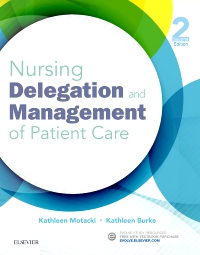
Nursing Delegation and Management of Patient Care - Elsevier eBook on VitalSource, 2nd Edition
Elsevier eBook on VitalSource

With a strong focus on the key areas included on the NCLEX-RN Exam’s "management of care" section, Nursing Delegation and Management of Patient Care, 2nd Edition prepares students to successfully prioritize, assign, and delegate nursing care to other members of the health care team. It provides the latest information on the roles and responsibilities of the staff nurse related to the management of patient care, the core competencies required of the nurse caring for patients, as well as a wide range of leadership and management concepts nurses need to confidently manage patients within a hospital unit. This new edition is organized according to the new 2014 Magnet Standards of Practice to help students learn the skills and competencies magnet status hospitals require when hiring nurses.
Newer Edition Available
Nursing Delegation and Management of Patient Care - Elsevier E-Book on VitalSource
-
- NEW! A new table of contents reorganized according to the 2014 Magnet Standards
- NEW! Addresses the competencies of the nurse’s role with respect to the 2014 Magnet Standards
- Coverage includes the latest information on the roles and responsibilities of the manager of patient care position, core competencies required of nurses caring for patients, and a wide range of management concepts students need to know before entering practice
- Emphasis on the NCLEX Exam "management of care" areas that students will be tested on, such as prioritization, delegation, and assignment
- Clinical Corner and Evidence-Based Practice boxes within most chapters include real-world tips and advice on patient and client management, plus the latest research on practices relevant to chapter topics
- Learning objectives, key terms, critical thinking case scenarios, and application exercises in each chapter provide students with plenty of opportunities for review
- NEW! End-of-chapter and Evolve NCLEX questions include analysis and application-level questions
- NEW! The latest RN design gives this edition a fresh new feel that is easier to follow
- A trusted author team with years of teaching experience in nursing leadership and management introduce current content related to the management of patient care in today’s health care setting
-
- NEW! A new table of contents reorganized according to the 2014 Magnet Standards.
- NEW! Addresses the competencies of the nurse’s role with respect to the 2014 Magnet Standards.
- Coverage includes the latest information on the roles and responsibilities of the manager of patient care position, core competencies required of nurses caring for patients, and a wide range of management concepts new nurses need to know before entering practice.
- Emphasis on the NCLEX Exam "management of care" areas that you will be tested on, such as prioritization, delegation, and assignment.
- Clinical Corner and Evidence-Based Practice boxes within most chapters include real-world tips and advice on patient and client management, plus the latest research on practices relevant to chapter topics.
- NEW! End-of-chapter and Evolve NCLEX questions include analysis and application-level questions.
- NEW! The latest RN design gives this edition a fresh new feel that is easier to follow.
-
Section 1: TRANSFORMATIONAL LEADERSHIP
1. Leadership and Management
2. Organizational Structure of Health Care
3. Strategic Management and Planning
4. Financial Management in Health Care
5. Health Care Regulatory and Certifying Agencies
Section 2: STRUCTURAL EMPOWERMENT
6. Organizational Decision Making and Shared Governance
7. Professional Decision Making and Advocacy
8. Communication in the Work Environment
9. Personnel Policies and Programs in the Workplace
Section 3: EXEMPLARY PROFESSIONAL PRACTICE
10. Professional Development
11. Professional Practice and Care Delivery Models and Emerging Practice Models
12. Staffing and Scheduling
13. Delegation of Nursing Tasks
14. Providing Competent Staff
15. Group Management for Effective Outcomes
16. Hospital Information Systems
17. Organizational Structure of Health Care
Section 4: NEW KNOWLEDGE, INNOVATIONS, AND IMPROVEMENTS
18. Improving Organizational Performance
19. Evidence-Based Practice
20. Monitoring Outcomes and the Use of Data for Improvement
Section 5: CONGRATULATIONS
21. The Immediate Future: Job Interviewing, NCLEX, and Continuing Education


 as described in our
as described in our 